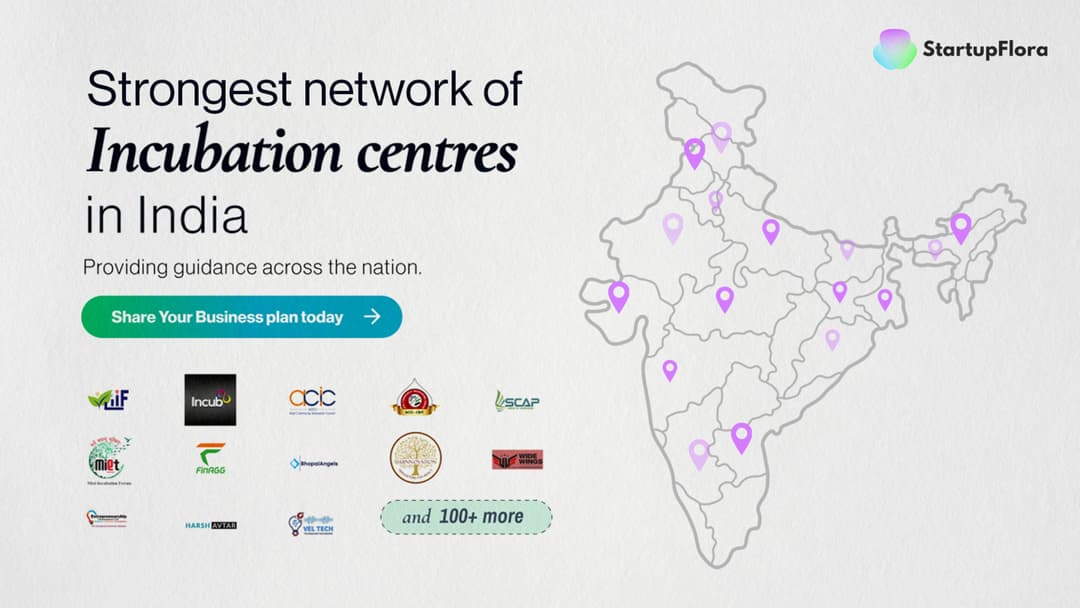India's Biggest Network
of Incubation Centers
Providing Guidance Across Nation
OUR STATS
300+
INCUBATION CENTERS












Step 1: Find the suitable Incubator
Success Stories
How can we get funds from Incubation?
Incubation Center in India: A Hub for Startup Dreams
India is witnessing a startup revolution, and at the heart of this growth are the country’s incubation centers. Whether you’re a student with an idea, an entrepreneur searching for mentorship, or an investor looking to spot the next big thing, understanding India's incubation centers is key to grasping how the country is fueling innovation. This article breaks down everything you need to know about incubation centers in India—how they work, their impact, the numbers, budgets, and the top centers making waves.

What Is an Incubation Center?
An incubation center (or startup incubator) is a supportive workspace that helps early-stage startups and entrepreneurs develop their ideas into successful businesses. Think of it as a greenhouse for startups—providing not just space, but also mentorship, funding access, business services, training, and networking opportunities.
Incubators are usually run by universities, government bodies, corporate organizations, or even as independent entities. Their primary goal is to help startups survive those challenging early days, guiding them from idea validation to market entry and beyond.
How Does an Incubation Center Work in India?
Incubation centers in India typically offer:
- Physical Space: Offices, co-working spaces, labs, and meeting rooms.
- Mentorship: Guidance from industry veterans, experienced entrepreneurs, and business experts.
- Business Support: Help with legal, accounting, HR, branding, and technology support.
- Networking: Connecting startups with investors, corporates, and potential partners.
- Funding Access: Direct seed funding or connections to angel investors and venture capitalists.
- Workshops and Training: Sessions on business model development, marketing, finance, and scaling up.
Many incubation centers in India have a structured selection process. Startups apply, present their ideas, and if selected, they become part of a cohort for a fixed period (usually 6-24 months). During this time, they get access to the full suite of services, sometimes in exchange for a small equity stake or a nominal fee.
How Many Incubation Centers Are There in India?
India is now one of the world’s top countries in terms of startup activity, and the number of incubation centers reflects this growth. As of 2024:
- There are over 192 incubation centers officially recognized and active across India.
- These centers are spread across universities, research institutes, private organizations, and government-backed setups.
- Major cities like Bangalore, Mumbai, Delhi, Hyderabad, Chennai, and Pune lead the count, but smaller cities and even rural areas are catching up fast, thanks to government initiatives and digital reach.
The number continues to grow, with the Government of India’s Atal Innovation Mission (AIM), Startup India, and various state policies pushing for more local startup hubs.
Budget of Incubation Centers
The budget for an incubation center in India varies widely, depending on the scale, location, and focus area. Some key insights:
- Government-funded incubation centers may operate on grants ranging from ₹1 crore to ₹20 crores (10 million to 200 million INR), especially those attached to IITs, NITs, or state innovation councils.
- University incubation centers often receive annual support of ₹50 lakhs to ₹5 crores, covering infrastructure, staff, events, and seed funding for startups.
- Private or corporate-run incubators may invest more, depending on their focus (deep tech, fintech, social innovation, etc.).
- Seed funding per startup typically ranges from ₹2 lakhs to ₹25 lakhs, with some giving equity funding and others just grants or loans.
Many incubation centers also raise money through partnerships, sponsored programs, corporate CSR initiatives, and sometimes through a small equity in their incubated startups.
Top Incubation Centers in India
India boasts some world-class incubation centers. Here are a few that set the benchmark:
- Startup Village, Kochi
- One of India’s earliest and most successful private-public startup incubators.
- Focuses on student startups and has produced multiple successful companies.
- T-Hub, Hyderabad
- The largest innovation campus in India.
- Government-backed, sector-agnostic, and home to over 600 startups.
- CIIE.CO (IIM Ahmedabad)
- Among the most reputed university incubators.
- Strong on mentoring, funding access, and global exposure.
- NSRCEL (IIM Bangalore)
- Known for academic depth and connects with corporate partners.
- Runs multiple focused programs (women entrepreneurship, rural, fintech).
- SINE (IIT Bombay)
- Tech-focused, ideal for deep-tech, hardware, and engineering startups.
- Atal Incubation Centers (AICs)
- Network of over 50 government-backed incubators across India under NITI Aayog.
- Villgro, Chennai
- Leading social impact incubator; specializes in rural, health, and agri-innovations.
There are many more, including state government-backed hubs (Kerala Startup Mission, Maharashtra’s MACCIA Incubators), and sector-specific incubators (for biotech, agri, fintech, etc.).
Why Incubation Centers Matter for India
- Job Creation: Each successful startup can generate dozens, even hundreds, of new jobs.
- Innovation Ecosystem: They bring academia, business, and government together.
- Regional Growth: Incubators are making entrepreneurship accessible beyond the big cities.
- Access to Global Markets: Many Indian incubation centers have tie-ups with global accelerators, opening doors for startups to go international.
Top Incubation Center by Rankings and Budgets
When it comes to finding a Top Incubation center in India, a few names consistently set the standard, not just in their success stories but also in the scale of investment they command. For example, the Start-up Incubation and Innovation Centre (SIIC) leads with a budget of ₹5 crore (₹50,000,000), followed by CIIE.CO (IIM Ahmedabad) at ₹3 crore (₹30,000,000), IIM Calcutta Innovation Park (IIMCIP) at ₹2.75 crore (₹27,500,000), Society for Innovation and Development (SID) at ₹2.69 crore (₹26,900,000), and The AIC NITTE Incubation Centre at ₹2.5 crore (₹25,000,000). These centers don’t just offer funding—they provide an end-to-end nurturing environment, helping startups scale rapidly and access global opportunities.
Choosing the Best Incubation Center in India for Your Startup
With hundreds of options available, picking the best incubation center in India means considering factors like funding size, mentor network, industry focus, and access to investors. The top incubation centers listed above are renowned for their comprehensive support, state-of-the-art facilities, and track record of helping startups become industry leaders. Whether you’re building a tech venture, a social enterprise, or anything in between, joining a top incubation center can give you the resources, credibility, and network needed to turn your startup dream into reality.
Challenges Faced by Incubation Centers
- Funding gaps: Especially for very early-stage ideas or in rural areas.
- Talent retention: It’s tough to keep top talent when bigger companies can pay more.
- Scaling support: Not all incubators can support scale-up, many focus only on the first year or two.
- Sustainability: Some centers struggle to sustain themselves after the initial grant period.
The Road Ahead: Future of Incubation Centers in India
India’s incubation story is still being written. With government backing, increasing corporate participation, and a surge of young entrepreneurs, the future looks promising. Upcoming trends include:
- Virtual incubation for remote/online startups.
- Sector-specific incubators (AI, climate tech, health tech).
- Deeper engagement with investors and global mentors.
- Greater focus on social and rural entrepreneurship.
StartupFlora Partnered with ATAL Incubation Center
After partnering with Atal Incubation Center, StartupFlora is building a strong bridge between incubation centers and startup founders. It helps entrepreneurs access funding, mentorship, and networking support. This collaboration empowers early-stage businesses to grow faster through structured incubation, innovation programs, and real-world startup guidance across multiple sectors.
Conclusion: Incubation Centers are the Backbone of India’s Startup Ecosystem
In summary, incubation centers in India are not just office spaces—they are launchpads, learning hubs, and support systems for thousands of new businesses. If you’re looking to start up, consider finding your local or sector-specific incubation center—they might just be the springboard you need. So, whether you’re asking “How many incubation centers are there in India?” or “How does an incubation center work in India?” or you want to know the “budget of incubation center” or which are the top incubation centers, the answer is: India has the numbers, the resources, and the momentum. The next unicorn could be incubating right now, maybe in your city!
How StartupFlora Helps You in Other Ways:
- Providing Secure and Unsecured Loans:
StartupFlora assists businesses and iIndividuals in obtaining both secure (backed by collateral) and unsecured (no collateral required) loans. This financial support can help you start, expand, or sustain your business without immediate financial strain.
- Access to Government Grants:
StartupFlora guides you through the process of identifying, applying for, and securing government grants. These grants can provide essential funding for innovation, expansion, or specific business projects—often without the obligation to repay.
- Wealth Management Services:
services, helping you plan, grow, and protect your financial assets. With expert advice, you can make informed investment decisions, manage risks, and work towards long-term financial stability.


















